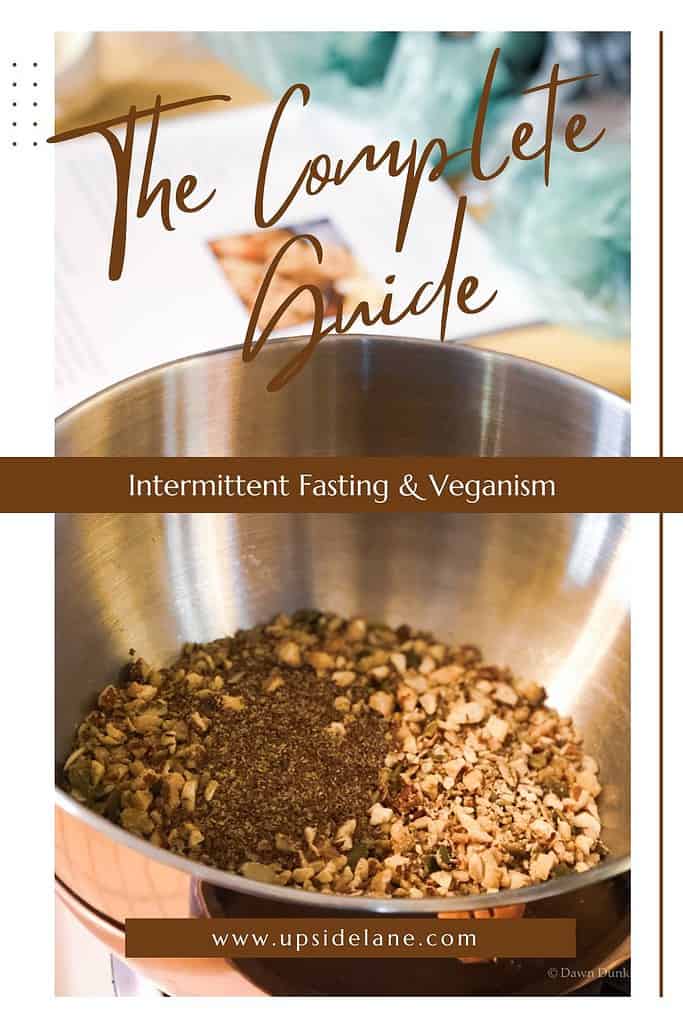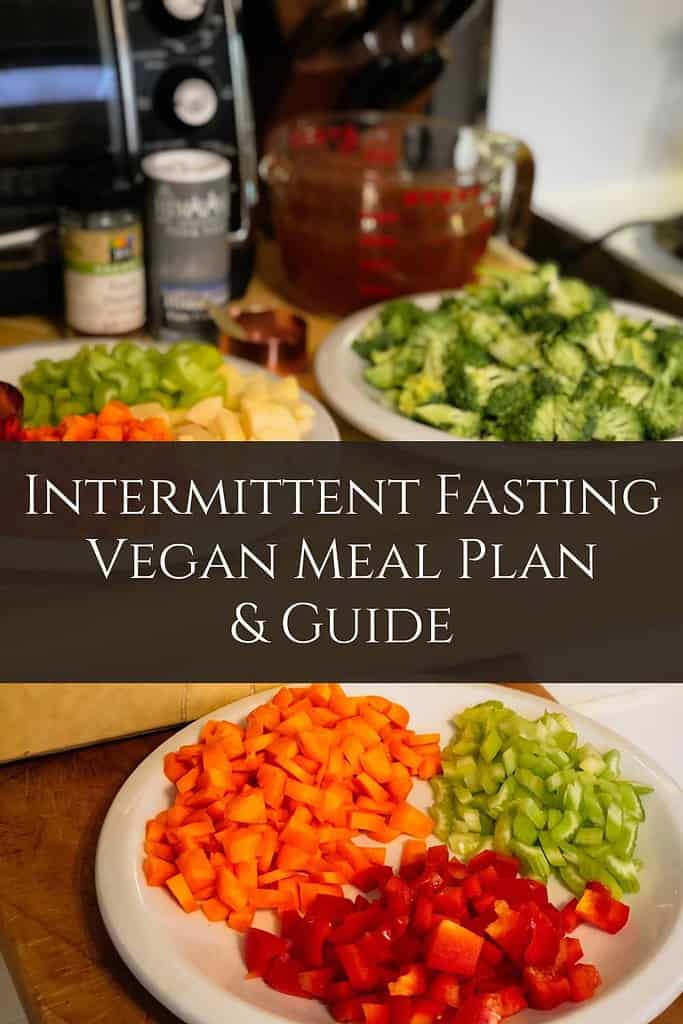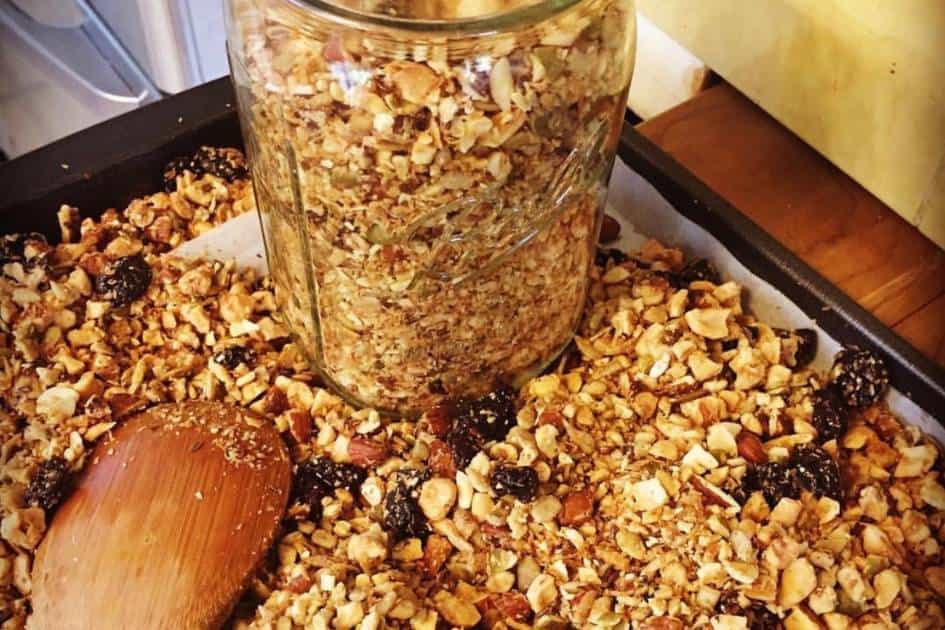Intermittent Fasting Vegan Meal Plan & Complete Guide
An intermittent fasting vegan meal plan. The perfect blend of fasting and veganism with practical tips and meal ideas for optimal health.

Explore an intermittent fasting vegan meal plan as a sustainable approach to health and well-being. A vegan intermittent fasting diet is the perfect blend of intermittent fasting and veganism.
Learning to design an intermittent fasting vegan meal plan is not difficult but it does take mindfulness and preparation.
In this article, we will learn about the combining power of intermittent fasting with the nourishing benefits of a vegan lifestyle.
We will look at science-backed insights, practical meal plans, and expert tips to seamlessly integrate intermittent fasting into your plant-based journey for enhanced well-being and sustainable health.
Intermittent Fasting Defined
Intermittent fasting isn’t a diet so much as a pattern of eating. It is more about when to eat your meals than what you eat, although making healthy food choices for yourself is always recommended.
A vegan intermittent fasting meal plan is an eating schedule, made up of plant-based foods, set up with periods of fasting and then periods of healthy eating.
Intermittent fasting has gained popularity in the health and wellness world and for good reason. It is easy to adopt and offers flexibility, allowing you to select the approach that works for you and aligns easily with your preferences and lifestyle.
SUMMARY
Intermittent fasting is a pattern of eating that offers flexibility, and is easy to adopt, which allows you to select the approach that works best for you and your lifestyle.
Methods Of Intermittent Fasting – How I Started
There is no set standard, and there are many ways to do intermittent fasting. The best method is one that you will stick to, and that means exploring the options, and determining what works well with your lifestyle.
For me, I started intermittent fasting years ago, before it even was “a thing.” I was working as a Pediatric Oncology Nurse in the hospital, and living a vegan lifestyle.
I enjoyed preparing plant-based meals for myself and for when I was at work but one day, we were so incredibly busy at the hospital that I simply didn’t eat all day.
Instead of feeling terrible, I actually felt pretty good! Of course, at the end of the day, I was tired but not as tired as one would expect from working a 14-hour day and not eating.
So I began a little experiment with myself, which as a Lifestyle Medicine Nurse, I tend to do. I implemented a liquid fast one day every week. For me, it was every Monday because that was one of the busiest days at the hospital.
In preparation for Monday, I would make myself three large green smoothies, and these were my meals for the day.
Without realizing it I was doing an intermittent fasting plan. My overall health improved, and I felt great.
I had more clarity and energy levels, my bloodwork improved, lost a few pounds, and truthfully could eat as much as I wanted to keep me satisfied on the other days, although I do always try to eat healthfully.

3 Popular Intermittent Fasting Methods
There is no set standard for intermittent fasting. That said, there are a few common methods as to how to incorporate intermittent fasting into your lifestyle.
- The 16/8 method: With this method, you have a 16-hour fasting window, and then an 8-hour window to eat. Most people will skip breakfast and then have a restricted eating window range from approximately 12:00 pm – 8:00 pm.
- The 5:2 method: This method involves a low-calorie intake, usually 500-600 calories, two days of the week, and then eating normally the other 5 days. The two lower-calorie days should be nonconsecutive.
- NOTE: Although this method is commonly used, it technically is not an intermittent fasting approach because there are no real fasting periods.
- Eat-stop-eat method: With this method, you will incorporate a full 24-hour fasting period one or two days per week.
SUMMARY
There are multiple ways to approach intermittent fasting with the 16/8 method being one of the more popular methods due to naturally fasting overnight.
Health Benefits of Intermittent Fasting
Research consistently highlights numerous health benefits of intermittent fasting, and while ongoing studies expand our understanding, here are some well-documented advantages to date (1) (2).
SUMMARY
Intermittent fasting provides numerous health benefits, and is protective against chronic conditions that are due to inflammation.
The Science Behind Intermittent Fasting: What happens in our body
Science shows that when we do intermittent fasting, there are metabolic changes that happen within our bodies.
During regular feeding times, we use glucose as our primary energy source throughout the day. However, in a fasted state, when we fast for prolonged periods, we begin to burn fat for energy. This is known as “metabolic switching” (3).
When our bodies are using glucose for fuel, insulin is the main hormone being used but when we are fasting, glucagon is the primary hormone, and our bodies use glycogen that has been stored in the liver for energy (3).
Metabolic switching begins right when the glycogen stores have been depleted and our body begins to metabolize fat for energy, which usually occurs after approximately 12 hours of fasting.
This process, burning fat for fuel, prevents the breakdown of muscle mass and its function and is thought to improve body composition in overweight individuals (3).
By practicing intermittent fasting, and reaching metabolic switching, we improve metabolism and increase our health and longevity (3).
SUMMARY
Prolonged periods of fasting allows our body to switch from burning glucose to burning fat for energy. This is known as “metabolic switching,” which improves health and longevity.

Veganism Defined
The word vegan was invented by Watson and Dorothy Morgan, and is based on “the first three and last two letters of ‘vegetarian’ (4).”
Veganism is defined as “the practice of abstaining from the use of animal products – particularly in the diet – and an associated philosophy that rejects the commodity status of animals. A person who follows the diet or philosophy is known as a vegan (4).”
Individuals adopt veganism for a variety of reasons, and there are distinct categories to differentiate these perspectives.
SUMMARY
Veganism is the practice of abstaining from animal products, however there are different categories of veganism depending on an individuals principles and philisophical beliefs.
Health Benefits Of A Vegan Lifestyle
Embracing a whole food plant-based diet, or dietary vegan lifestyle, has demonstrated multiple health and longevity benefits both physical and mental. Here are some of the benefits (5).
Physical Benefits
- improve weight management and metabolism
- reduce cholesterol
- reduce blood pressure
- reduced risk of chronic disease due to inflammation
Emotional Benefits
- decrease anxiety
- decrease depression
- decrease fatigue
- improved overall sense of well-being
- improved daily function
Combining Intermittent Fasting And Veganism
While specific studies on the combined effects of intermittent fasting and veganism are lacking, and further research is needed, there is a potential synergistic effect when integrating both practices.
Some of the potential benefits of an intermittent fasting vegan meal plan are enhanced metabolic flexibility including the reduction of body fat, improved insulin sensitivity, improved brain functioning, improved heart health, reduced cancer risk, and potential anti-aging benefits.
SUMMARY
While specific studies linking intermittent fasting and veganism are lacking, and further research is needed, combining both practices may yield a synergistic effect.
Organizing Your Intermittent Fasting Vegan Meal Plan
When planning your intermittent fasting vegan meal plan, it is important to consider macronutrient factors to create well-balanced meals that support your nutritional needs and enhance the benefits of both intermittent fasting and a vegan diet.
Balanced Macronutrient Ratios: It is important to avoid junk food, and ensure a well-balanced distribution of proteins, carbohydrates, and fats, as every macronutrient plays a vital role in supporting overall health.
Protein Sources: There are a variety of plant-based proteins to choose from to meet your body’s requirements such as beans, legumes, nuts, seeds, tofu, and tempeh.
Carbohydrate Sources: It is important to choose complex carbohydrates and high-fiber foods such as leafy greens, fruits, vegetables, and whole grains. Versus refined sugars and processed carbs such as bread, pasta, cereals, and cookies.
Fat Sources: Incorporating healthy fats into your diet is important for satiety and avoiding hunger pangs, as well as brain health and nutrient absorption. Healthy fats to consider are nuts, seeds, avocado, and olive oil.
Just as important in the design of an intermittent fasting vegan meal plan are the micronutrients to consider.
Make sure your meal plan has a variety of nutrient-dense whole foods to ensure you are meeting proper vitamin and mineral requirements. This involves eating a colorful array of fruits and vegetables in your meals.

Hydration Is Crucial When Fasting
It is important to stay well-hydrated during periods of fasting. Water is essential for overall health but it is especially important when fasting.
Staying well-hydrated not only aids in suppressing hunger during fasting but it also facilitates the elimination of any unwanted cellular debris and breakdown from the body.
Staying hydrated will help maintain energy levels, and it will reduce any potential side effects of fasting like headaches, fatigue, and irritability (6).
Drinking plenty of water is always a good choice but there are other drinks you may also want to consider while intermittent fasting.
- Black coffee – hot or iced
- Black tea – hot or iced
- Herbal tea – hot or iced
- Seltzer water – without added sugar
- Flavored water – with a tablespoon or so of orange, lime, or lemon juice
- Apple cider vinegar – 1 to 2 tablespoons in 8 to 10 ounces of water. Some feel this helps curb their appetite while fasting
- NOTE: If you do drink apple cider vinegar diluted in water regularly, you may want to consider using a straw to keep the vinegar off of the enamel of your teeth to prevent tooth decay.
These beverages are safe to consume during the fasting state and will not spike your blood sugar.
Make sure to avoid adding milk, cream, or sugar to any of these drinks, as it can significantly raise your blood sugar and insulin levels.
SUMMARY
When creating your intermittent fasting vegan meal plan, aim for a balanced mix of protein, carbohydrates, and fats, along with colorful, nutrient-rich foods. It is also importnat to stay well-hydrated during fasting.
5 Top Tips For Success
Here are five helpful suggestions to set you up for success when designing an intermittent fasting vegan meal plan.
1. Gradual Transition
Embarking on a whole food plant-based diet and intermittent fasting simultaneously can be overwhelming, especially for beginners. It may be more manageable to adopt one eating style first, master it, and then gradually integrate the other.
2. Monitor Nutritional Intake
Effective meal planning is important when combining a vegan diet and intermittent fasting. Consuming fewer calories necessitates a focus on obtaining sufficient high-quality nutrients and vitamins.
3. Meal Variety
A great way to ensure you are eating a healthy diet is to incorporate a diverse range of foods into your own meal plan. This approach helps to ensure you are getting the most fiber and nutrients out of each meal.
4. Hydrate
Drinking plenty of water prevents you from getting dehydrated, and helps you feel full longer. The best way to ensure you are drinking plenty is to carry a water bottle with you throughout the day.
5. Listen To Your Body
Listening to your body, and all of its signs and symptoms is important when you are embarking on a dietary lifestyle change. Intermittent fasting is not a fad diet, nor is veganism, and paying attention to how your body responds to both is important and necessary.
SUMMARY
It is important to set yourself up for success when designing an intermittent fasting vegan meal plan. Ease into fasting if you are new to it, eat high quality nutrient-dense food, mix up the type of foods you eat for variety, drink plenty of water, and listen to your body.
Is Intermittent Fasting With Veganism Safe?
Practicing intermittent fasting along with veganism is done for a variety of reasons. Some people use it as a weight loss method or for weight management, while others choose to do intermittent fasting and veganism for health and longevity.
It is important to talk to your primary healthcare professional before trying intermittent fasting, or any change in your diet and physical activity for that matter.
Intermittent fasting in particular is not for everyone and should be avoided for people with certain conditions.
- Diabetes – type I, and even type II if they are having a difficult time maintaining stable blood sugar levels.
- Kidney disease
- Children
- Pregnant women
- Breastfeeding
- Thyroid disorders
- Underweight
- History of an eating disorder
SUMMARY
Intermittent fasting and veganism are not for everyone and it is important to talk to your medical healthcare professional before embarking on any new diet or lifestyle activity.

Common Myths And Concerns
Navigating the dietary approaches of intermittent fasting and veganism often brings about various myths and concerns that can cloud understanding and decision-making.
Here are several common misconceptions surrounding intermittent fasting and veganism.
Nutritional Deficiencies
Myth: You cannot get all of the essential nutrients with a vegan diet.
Fact: A well-planned vegan diet, with plenty of variety and colorful plant-based foods, can provide all of the essential nutrients and more.
Muscle Loss
Myth: Fasting causes you to lose muscle.
Fact: Because of metabolic switching, intermittent fasting combined with a balanced diet can help preserve muscle mass. Ensuring adequate protein intake and incorporating resistance training into one’s lifestyle will further support muscle maintenance.
Loss of Energy
Myth: Fasting and veganism cause you to be tired with low energy levels.
Fact: Properly executed intermittent fasting along with a well-planned vegan diet can supply sufficient energy. Making sure to eat well-balanced meals with nutrient-rich foods is key to sustaining energy levels.
Inadequate Protein
Myth: It is hard to get enough protein when you are on a vegan diet.
Fact: A varied vegan diet can easily meet protein requirements. Plant-based sources such as legumes, tofu, tempeh, and quinoa offer ample protein.
Impaired Brain Function
Myth: Fasting negatively affects cognitive function.
Fact: A well-nourished vegan diet can contribute to well-being, and some studies suggest intermittent fasting may enhance brain health (7).
Iron Deficiency
Myth: You will get an iron deficiency on a vegan diet.
Fact: Plant-based iron-rich sources are as effective as animal sources when consumed with vitamin C-rich foods. Proper food combinations will enhance iron absorption.
Unsustainable
Myth: Intermittent fasting and veganism are fad diets and unsustainable.
Fact: Many people successfully maintain an intermittent fasting vegan lifestyle and live long and healthy lives.
Social Isolation
Myth: Fasting and veganism make social interactions difficult.
Fact: With awareness and communication, it is possible to navigate social situations and enjoy meals with friends and family while fasting and on a vegan diet.
These two powerful approaches, intermittent fasting, and veganism, can seamlessly integrate to provide a healthy, balanced, and sustainable lifestyle.
Personalize Your Intermittent Fasting Vegan Meal Plan
An intermittent fasting vegan meal plan offers a synergistic approach to overall well-being. It is a combination that improves metabolic flexibility, weight management, enhanced nutrient intake, and more.
Using these two approaches together creates a sustainable path toward achieving optimal health and longevity.
I encourage you to tailor your intermittent fasting vegan meal plan to your own needs and preferences. This personalized approach will help you discover the most sustainable and fulfilling path on your wellness journey.
SUMMARY
Taking a personalized approach toward intermittent fasting and veganism will help you discover the most sustainable and fulfilling path on your wellness journey.
Need Help Getting Started?
If you are looking for further guidance and a way to jumpstart a healthy routine, consider the 5-Day Rejuvenation Diet & Guide.
I originally developed this 32-page guide for my clients, who were looking for a roadmap of sorts to quickly get back on track toward a healthy lifestyle.
The 5-Day Rejuvenation Diet & Guide provides you with exactly what to eat for the 5 days on the diet, as well as all of the recipes, a shopping list to bring to the grocery store, information on what happens inside your body every step of the way, plus a Q&A page of the most common questions.
Many of my clients have told me they have increased energy, better sleep, improved mental clarity, weight loss, and more after doing this program.
The 5-Day Rejuvenation Diet is 100% plant-based and would be a great way to springboard into a personalized intermittent fasting vegan meal plan afterward.
VIDEO: Watch this video to learn about the 5-Day Rejuvenation Diet and how I prepare for it
Check out these posts for more nourishing recipes and caregiver support
Let’s Connect
If you enjoyed this article on intermittent fasting and veganism, please consider commenting below, and sharing it with friends and family whom you think might benefit from reading it.
Also, please let me know your thoughts in the comment section below. I’d love to hear from you.
References
- https://www.hopkinsmedicine.org/health/wellness-and-prevention/intermittent-fasting-what-is-it-and-how-does-it-work
- https://www.mayoclinic.org/healthy-lifestyle/nutrition-and-healthy-eating/expert-answers/intermittent-fasting/faq-20441303
- https://www.ncbi.nlm.nih.gov/pmc/articles/PMC8839325/
- https://en.wikipedia.org/wiki/Veganism
- https://nutritionfacts.org/topics/vegans/
- https://health.clevelandclinic.org/5-tips-for-fasting-the-healthy-way
- https://www.health.harvard.edu/blog/intermittent-fasting-surprising-update-2018062914156




